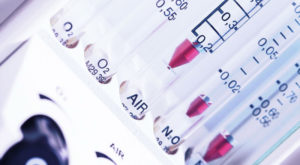
Going to the doctor can bring up a lot of emotions for your child. They may experience some unfamiliar situations that cause anxiety, and they may need to have some procedures that cause some discomfort.
Fortunately, there are resources, such as child life specialists, that can make you and your child as comfortable as possible in a safe, child-friendly environment.
One of these resources is nitrous oxide — often called laughing gas — which can be used for procedures that may cause your child pain or anxiety. Nitrous oxide is a very quick-acting inhaled sedation medicine that is often given at the dentist’s office, and it allows your child’s physician to safely do the procedures your child needs without unnecessary discomfort.
How Is Nitrous Oxide Given?
Your child will inhale the nitrous oxide through a mask, and breathe in and out normally through their nose. They can pick the smell of the mask, such as bubble gum or strawberry. Sometimes, younger children may resist the mask. If this happens, the nurse may gently help hold the mask in place.
The nitrous oxide will make your child feel relaxed and sleepy. It does not cause a deep sleep, as general anesthesia does. It will be given a few minutes before the procedure starts and may continue until it is finished.
For safety during sedation, a nurse will monitor your child until the medicine has worn off.
What Are The Side Effects Of Nitrous Oxide?
Nitrous oxide is safe for use in children and there are no long-term side effects. However, as with all medicines, some side effects may occur for a short time, such as:
- Headache
- Nausea
- Vomiting
Be sure to discuss any questions you may have with your child’s physician or nurse.
What Can I Expect After The Nitrous Oxide Is Stopped?
Once the mask is removed, nitrous oxide wears off very quickly. Usually, children return to a pre-nitrous status comfortably. Your child may be a little disoriented and irritable, but this usually lasts only a very short time.
A nurse will monitor your child until the medicine has worn off. If your child is leaving the hospital the same day, it’s important to stay with them. Your child may eat right away unless there is a reason not to, such as another procedure. Once you get home, your child may go back to regular activities.
How Can I Help My Child If They Need Nitrous Oxide?
You are welcome to stay in the room while your child is receiving the nitrous oxide. For some procedures, you may be able to stay the entire time. Your child may find your presence during procedures helpful. Pregnant women are not allowed in the room because of extremely rare but possible risks to the baby.
There are a few ways you can help your child feel more comfortable while they are given nitrous oxide, such as:
- Reassuring and explaining to your child in simple words what is being done and why
- Telling them the truth about what is happening
- Remaining calm — the more relaxed you and your child are, the easier the test will be
Remember, the nurses and physicians are here to help both your child and you, so be sure to ask them if you have any questions or concerns.
When Should I Call My Child’s Physician?
Call your child’s physician if your child:
- Vomits more than twice
- Is extremely irritable
- Is having trouble being aroused
- Call 9-1-1 right away if your child shows signs of an allergic reaction, including:
- Fever or chills
- Rash or hives
- Wheezing
- Trouble breathing
What Else Do I Need To Know About Nitrous Oxide?
All children are different, and nitrous oxide does not work for everyone. If the procedure cannot be completed with nitrous oxide, your child’s nurse and physician will discuss other options with you. You may also be asked to sign a consent form for some procedures.
Do you have more questions related to nitrous oxide? Contact the Radiology Child Life Specialist at 402-955-4042 or the Radiology Department at 402-955-5602.
What To Do Next
For Patients
Your child will need an order from a provider to schedule a radiology procedure. Once the order is placed, call 402-955-6799 to schedule the procedure.
For Referring Providers
The Physicians’ Priority Line is your 24-hour link to pediatric specialists at Children’s for referrals, emergency and urgent consults, physician-to-physician consults, admissions, and transport services. Call 855-850-KIDS (5437).
Learn more about referring patients.